- Home
- Pat Barker
The Ghost Road
The Ghost Road Read online
PAT BARKER
The Ghost Road
PENGUIN BOOKS
Contents
PART ONE
One
Two
Three
Four
Five
Six
PART TWO
Seven
Eight
Nine
Ten
Eleven
Twelve
Thirteen
PART THREE
Fourteen
Fifteen
Sixteen
Seventeen
Eighteen
Author’s Note
PENGUIN BOOKS
THE GHOST ROAD
‘A great achievement’ Giles Foden
‘An extraordinary tour de force. I’m convinced that the trilogy will win recognition as one of the few real masterpieces of late 20th-century British fiction’ Jonathan Coe
‘She is daring, wise and a pleasure to read’ A.S. Byatt
‘A magnificent addition to our literature of war’ Peter Kemp
‘A powerful and deeply moving novel. One of the most distinguished works of contemporary fiction. This book is a triumph’ Sunday Times
‘Unforgettable. At the end, I had tears running down my cheeks’ Observer
‘An outstanding achievement’ Daily Telegraph
‘Harrowing, original, delicate and unforgettable’ Independent
‘A beautifully written book. Barker has produced a trilogy which is right up there with the other classics of First World War Literature. I could not recommend it more highly’ Spectator
‘An atmospheric, unforgettable, valuable novel which brings to a close a trilogy demanding to be read by everyone’ Irish Times
‘A startlingly good novel. With the other two volumes of the trilogy, it forms one of the richest and most rewarding works of fiction of recent times. Intricately plotted, beautifully written, skillfully assembled, tender, horrifying and funny’ The Times Literary Supplement
‘One of the strongest and most interesting novelists of her generation’ Guardian
ABOUT THE AUTHOR
Pat Barker was born in Thornaby-on-Tees in 1943. She was educated at the London School of Economics and has been a teacher of history and politics. Her books include Union Street (1982), winner of the 1983 Fawcett Prize, which has been filmed as Stanley and Iris; Blow Your House Down (1984); Liza’s England (1986), formerly The Century’s Daughter; The Man Who Wasn’t There (1989); the highly acclaimed Regeneration trilogy, comprising Regeneration, The Eye in The Door, winner of the 1993 Guardian Fiction Prize, and The Ghost Road, winner of the 1995 Booker Prize for Fiction and Another World. Her latest novel is Life Class.
Pat Barker is married and lives in Durham.
For David
Now all roads lead to France
And heavy is the tread
Of the living; but the dead
Returning lightly dance
‘Roads’, Edward Thomas
PART ONE
One
In deck-chairs all along the front the bald pink knees of Bradford businessmen nuzzled the sun.
Billy Prior leant on the sea-wall. Ten or twelve feet below him a family was gathering its things together for the trek back to boarding-house or railway station. A fat, middle-aged woman, swollen feet bulging over lace-up shoes, a man with a lobster-coloured tonsure – my God, he’d be regretting it tomorrow – and a small child, a boy, being towelled dry by a young woman. His little tassel wobbled as he stood, square-mouthed with pain, howling, ‘Ma-a-am.’ Wet sand was the problem. It always was, Prior remembered. However carefully you tiptoed back from that final paddle, your legs got coated all over again, and the towel always hurt.
The child wriggled and his mother slapped him hard, leaving red prints on his chubby buttocks. He stopped screaming, gulped with shock, then settled down to a persistent grizzle. The older woman protested, ‘Hey, our Louie, there’s no need for that.’ She grabbed the towel. ‘C’mon, give it here, you’ve no bloody patience, you.’
The girl – but she was not a girl, she was a woman of twenty-five or twenty-six, perhaps – retreated, resentful but also relieved. You could see her problem. Married, but the war, whether by widowing her or simply by taking her husband away, had reduced her to a position of tutelage in her mother’s house, and then what was the point? Hot spunk trickling down the thigh, the months of heaviness, the child born on a gush of blood – if all that didn’t entitle you to the status and independence of a woman, what did? Oh, and she’d be frustrated too. Her old single bed back, or perhaps a double bed with the child, listening to snores and creaks and farts from her parents’ bed on the other side of the wall.
She was scrabbling in her handbag, dislodging bus tickets, comb, purse, producing, finally, a packet of Woodbines. She let the cigarette dangle wetly from her lower lip while she groped for the matches. Her lips were plump, a pale salmon pink at the centre, darkening to brownish red at the edges. She glanced up, caught him looking at her, and flushed, not with pleasure – his lust was too blatant to be flattering – but drawn by it, nevertheless, into the memory of her unencumbered girlhood.
Her mother was helping the little boy step into his drawers, his hand a dimpled starfish on her broad shoulder. The flare of the match caught her attention. ‘For God’s sake, Louie,’ she snapped. ‘If you could only see how common you look …’
Louie’s gaze hadn’t moved. Her mother turned and squinted up into the sun, seeing the characteristic silhouette that said ‘officer’. ‘Look for the thin knees,’ German snipers were told, but where they saw prey this woman saw a predator. If he’d been a private she’d have asked him what the bloody hell he thought he was gawping at. As it was, she said, ‘Nice weather we’re having, sir.’
Prior smiled, amused, recognizing his mother’s speech, the accent of working-class gentility. ‘Let’s hope it lasts.’
He touched his cap and withdrew, thinking, as he strolled off, that the girl was neither a widow nor married. The way the mother’s voice had cracked with panic over that word ‘common’ said it all. Louie’s knees were by no means glued together, even after the child. And her mother was absolutely right, with that fag stuck in her mouth she did look common. Gloriously, devastatingly, fuckably common.
He ought to be getting back to barracks. He had his medical in less than an hour, and it certainly wouldn’t do to arrive gasping. He had no business to be drifting along the front looking at girls. But he looked anyway, hoarding golden fuzz on a bare arm, the bluish shadow between breasts thrust together by stays, breathing in lavender sharpened by sweat.
The blare of music inside the fairground drew him to stand in the entrance. So far today the only young men he’d seen had been in uniform, but here were men as young as himself in civilian dress. Munitions workers. One of them was chatting to a young girl with bright yellow skin. He felt the automatic flow of bile begin and turned away, forcing himself to contemplate the bald grass. A child, holding a stick of candy-floss, turned to watch him, attracted to the man who stood so still among all the swirl and dazzle. He caught her looking at him and smiled, remembering the soft cotton-wool sweetness of candy-floss that turned to clag on the roof of your mouth. She bridled and turned away, clutching her mother’s skirt. Very wise.
As he walked on, his smile faded. He could have been a munitions worker, he thought. Kept out of danger. Lined his pockets. His father would have wangled him a place in a nice safe reserved occupation, and would not have despised him for it either, unlike many fathers. The weedy little runt would at least have been behaving like a sensible weedy little runt, refusing to fight in ‘the bosses’ war’. But he’d never seriously considered doing that.
Why not? he wondered now.
Because I don’t want to be one of them, he thought, remembering a munitions worker’s hand patting a girl’s bottom as he helped her into the swing-boat. Not duty, not patriotism, not fear of what other people would think, certainly not that. No, a kind of … fastidiousness. Once, as a small boy, he’d slipped chewed-up pieces of fatty mutton into the pocket of his trousers, because he couldn’t bring himself to swallow them, and his father, when the crime came to light, had said, in tones of ringing disgust, ‘That bairn’s too fussy to live.’ Too fussy to live, Prior thought. There you are, nowhere near France and an epitaph already. The thought cheered him up enormously.
By now he was walking up the hill towards the barracks, a chest-tightening climb, but he was managing it well. His asthma was good at the moment, better than it had been for months. All the same it might be as well to sit quietly somewhere for a few minutes before he went into the examination room. In the end all he could do was to turn up in a reasonable state, and answer the questions honestly (or at least tell no lies that were likely to be found out). The decision would be taken by other people. It always was.
Though he had managed to take one decision himself.
His thoughts shifted to Charles Manning and the last evening they’d spent together in London.
– Have you stopped to think what’s going to happen if you’re not sent back? Manning had asked. Six months, at least six months, probably to the end of the war, making sure new recruits wash between their toes.
– Might have its moments.
– Doing a hundred and one completely routine jobs, each of which could be done equally well by somebody else. You’d be much better working at the Ministry. I can’t promise to keep the job open.
– No, thank you, Charles.
No, thank you. He was passing the Clarence Gardens Hotel where he’d been stationed briefly last winter before the summons to London came. Plenty of routine jobs there. He and Owen, his fellow nutcase, had arrived on the same day, neither of them welcomed by the CO. They’d been assigned to ‘light duties’. Prior became an administrative dogs-body, sorting out the battalion’s chaotic filing system. Owen fared yet worse, chivvying the charladies, ordering vegetables, peering into lavatory bowls in search of unmilitary stains. Mitchell had given them hell. Prior got him in the mornings when he was totally vile, Owen in the evenings when brandy had mellowed him slightly.
– What do you expect? Prior said, when Owen complained. He’s lost two sons. And who shows up instead of them? Couple of twitching Nancy boys from a loony-bin in Scotland.
Silence from Owen.
– That’s what he thinks, you know.
As he reached the entrance to the barracks, a squad of men in singlets and shorts, returning from a cross-country run, overtook him and he stood back to let them pass. Bare thighs streaked with mud, steam rising from sweaty chests, glazed eyes, slack mouths, and as they pounded and panted past, he recognized Owen at the head of the column, turning to wave.
‘Good heavens,’ Mather said, as Prior pulled off his shirt. ‘You haven’t been getting much outdoor exercise, have you?’
‘I’ve been working at the Ministry of Munitions.’
Mather was middle aged, furrow-cheeked, sandy-haired, shrewd.
‘All right, drop your drawers. Bend over.’
They always went for the arse, Prior thought, doing as he was told. An army marches on its stomach, and hobbles on its haemorrhoids. He felt gloved fingers on his buttocks, separating them, and thought, Better men than you have paid for this.
‘I see you’ve got asthma.’
There? ‘Yes, sir.’
‘Turn round.’
Another unduly intimate gesture.
‘Cough’
Prior cleared his throat.
‘I said, cough.’ The fingers jabbed. ‘And again.’ The hand changed sides. ‘Again.’
Prior was aware of wheezing as he caught his breath.
‘How long?’
Prior looked blank, then stammered. ‘S-six months, sir.’
‘Six months? But it says –’
‘I mean, the doctor told my mother I had it when I was six months old, sir.’
‘Ah.’ Mather turned over a page of the file. ‘That makes more sense.’
‘Apparently I couldn’t tolerate milk.’
Mather looked up. ‘Awkward little bugger, weren’t you? Well, we’d better have a listen.’ He reached for his stethoscope and came towards Prior. ‘What were you doing at the Ministry of Munitions?’
‘Intelligence, sir.’
‘Oooh, very impressive. Catch anybody?’
Prior looked bleakly ahead of him. ‘Yes.’
‘Patrol here caught a German spy on the cliffs.’ Mather snorted, fitting the stethoscope. ‘Tickled a local yokel with their bayonets more like.’
Prior started to say something, but Mather was listening to his chest. After a few minutes, he straightened up. ‘Yes, you have got a bit of a wheeze.’ His attention was caught by the scar on Prior’s elbow. He turned the arm towards him.
‘The Somme,’ Prior said.
‘Must’ve hurt.’
‘The expression “funny bone” didn’t seem appropriate at the time.’
Mather went back to the desk, sat down. ‘Now let’s see if I’ve got this straight. You were invalided home with shell-shock. That right? April last year?’
‘Yes, sir.’
‘And you were sent first to Netley and then to Craiglockhart War Hospital, where you remained till … November.’ He looked up. ‘I suppose you get a lot of dipsomania, in places like that? Alcohol, man,’ he explained, as Prior continued to look blank.
‘Didn’t see any, sir. If I had I’d certainly have drunk it.’
‘So what were your symptoms?’
‘I was mute, sir. Some people found it an improvement on the basic model.’
But Mather was reading, not listening. ‘W. H. R. Rivers,’ he said. ‘I knew him. He was two years ahead of me at Bart’s. Paralytic stammer.’
Prior looked puzzled. ‘No.’
‘Ah? Got his own voice back too. He must be good.’ He tapped a sheet of paper. ‘The discharge report says asthma.’
‘I had two attacks while I was there.’
‘Hm.’ Mather smiled. ‘Any problems with the nerves now?’
‘No.’
‘Appetite?’
‘I could eat more than I get.’
‘So could we all, laddie. Sleeping all right?’
‘Not last night. Bloody tent leaks.’
‘Generally?’
‘I sleep all right.’
Mather sat back in his chair. ‘How did you get in?’
‘Through the flap.’
Mather’s forefinger shot up. ‘Watch it, laddie. How did you get into the army?’
A brief struggle with temptation, ending as Prior’s struggles with temptation usually did. ‘I lied to the doctor, Doctor.’
Surprisingly, Mather laughed, a short bark.
‘Everybody lied,’ Prior said.
‘So they did, I remember it well. I saw men who’d climbed out of the window of the workhouse infirmary to come and enlist. Syphilis, epilepsy, tuberculosis, rickets. One lad – little squeaky voice, not a hair on his chin, fourteen, if that – looked me straight in the eye and swore on his mother’s life he was nineteen.’ Mather smiled, revealing brown teeth. ‘Not one of them got past me.’
Oh fuck.
‘Gas training,’ Mather said.
Silence.
‘Well?’
‘Terribly good idea,’ Prior said earnestly.
‘Did you go through the huts?’
‘No.’
‘You must be affected at very low concentrations?’
‘I was known as the battalion canary, sir. Partly that. Partly my pleasant, cheerful personality.’
Mather looked at him. ‘Get dressed.’
‘The point is I managed perfectly well for three years. I didn’t once report sick with
asthma or the effects of gas.’
‘Yes, laddie.’ Mather looked unexpectedly compassionate. ‘And it might be said you’ve done your bit.’
A twitch of the pale, proud face. ‘Not by me.’
‘And the asthma never played you up in France?’
‘Never.’
‘Two attacks in Craiglockhart. None in France. I wonder why?’
‘Open-air life suited my chest, sir.’
‘We’re not running a sanatorium, laddie. Go on, get dressed. Then you go left along the corridor, turn left at the end, and you’ll see a row of chairs. Wait there.’
Mather went into the adjoining room and started on his next victim. Prior dressed, pausing to wipe the sweat off his upper lip. Like going over the top, he thought. No, it wasn’t. Nothing was like that. Civilians seemed to use that expression all the time now. I went a bit over the top last night, they said, meaning they’d had a second glass of port. Prior peered into the small looking-glass behind the wash-basin, checking the knot in his tie. If they didn’t send him back he was going to be awfully lonely, marooned among civilians with their glib talk. His reflection jeered, Lonely? You? Oh, c’mon, duckie. You can always split in two. At least the Board didn’t know about that. Or rather they didn’t, provided Rivers hadn’t written to them. A paralytic stammer. Not just any old stammer. Paralytic. Interesting, Prior thought, letting himself out of the room.
The place smelled like a barracks. Well, it was a barracks, but the Clarence Gardens Hotel, after months of army use, had not smelled anything like this. His nose twitched, identifying armpits, feet, socks, oil, boot-polish, carbolic soap, the last blown in bubbles between the raw fingers of a boy scrubbing the floor. Rear-end like a truck and a face to match, but Prior produced a charming smile, nevertheless, because he owed it to himself, and strode on, leaving a trail of muddy footprints across the wet floor.
One man waiting. Owen.
‘The O’s and the P’s again,’ Owen said, picking up a pile of John Bulls from the vacant chair and dumping them on the floor. They’d last waited together like this at Craiglockhart, at their final board.

 Border Crossing
Border Crossing The Silence of the Girls
The Silence of the Girls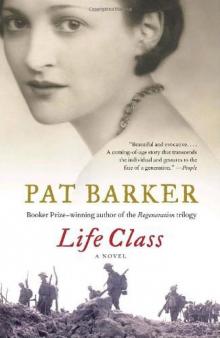 Life Class
Life Class Regeneration
Regeneration Another World
Another World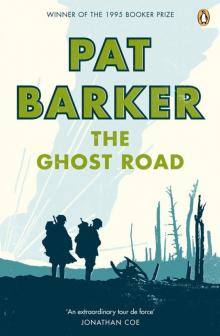 The Ghost Road
The Ghost Road Double Vision
Double Vision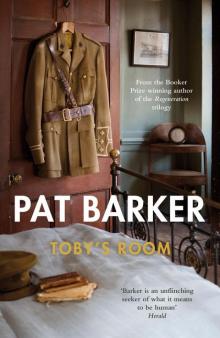 Toby's Room
Toby's Room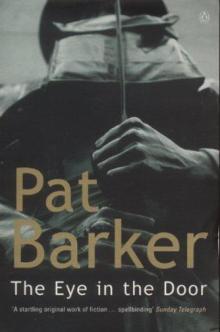 Regeneration Trilogy 02 - The Eye in the Door
Regeneration Trilogy 02 - The Eye in the Door The Eye in the Door
The Eye in the Door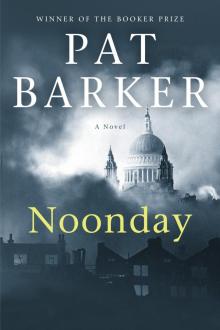 Noonday
Noonday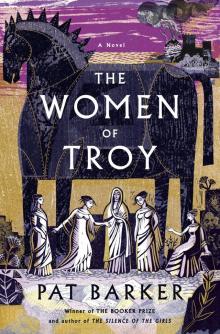 The Women of Troy: A Novel
The Women of Troy: A Novel